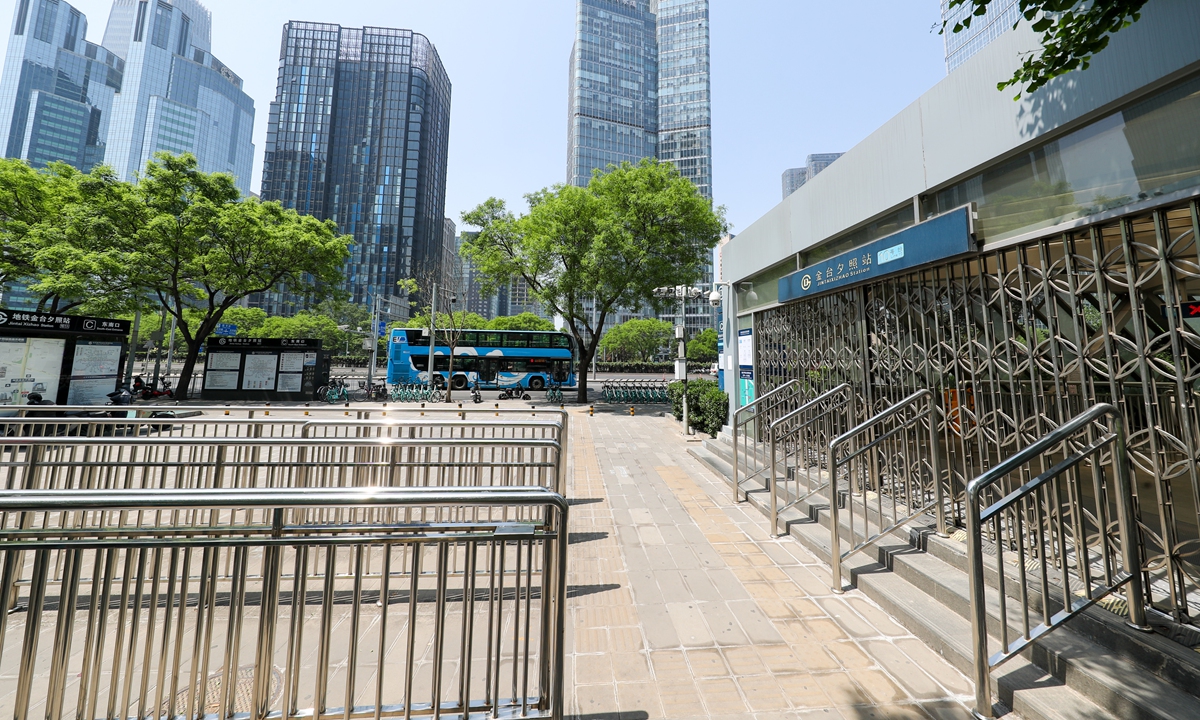
On May 4, 2022, an entrance of the Jintaixizhao subway station in Chaoyang district, Beijing is seen closed. Beijing has closed some stops and stations along bus routes and subway lines amid the latest COVID flare-up. Photo: VCG
Beijing on Wednesday doubled down on measures to curb viral transmission by asking residents in Chaoyang district to work at home, extending the suspension of restaurants' dining-in services as well as closing some stops and stations along bus routes and subway lines.
Residents in some key areas of Beijing's most populous Chaoyang district will have to start working at home from Thursday, and those who must work in their offices should travel by themselves and reduce gatherings at companies, Xu Hejian, spokesperson of the Beijing municipal government, said at Wednesday's media briefing.
Xu said that Beijing will continue its epidemic measures after the May Day holidays, which ran from April 30 to May 4, including the delay of primary and middle schools' reopening and the closure of entertainment, cultural and sports venues.
Beijing has also closed some stops and stations along bus routes and subway lines. According to Beijing Public Transport Corporation, 158 bus routes running within Chaoyang district and 31 routes in Fangshan district will be adjusted from Wednesday.
While 63 routes in Chaoyang and 12 in Fangshan will be fully shut down, buses on other routes will either skip some stops or only run along certain areas in the lines.
Xu also announced the close of entrances and exits at 62 subway stations along 14 lines from Wednesday, adding that the measure will not affect passengers changing lines inside interchange stations.
These stricter measures came after its fresh COVID-19 flare-up has seen over 500 infections since the end of April.
Xu said that the total cases in the fresh wave of the epidemic in the capital had exceeded the number reported in cluster infections in the Xinfadi wholesale market in 2020.
The Xinfadi outbreak in June-August 2020 was the worst epidemic in the capital in the past two years. It was put under control in 40 days with a total case number of 335. Beijing reported 52 new cases from Tuesday afternoon to Wednesday afternoon, bringing the tally to 505 cases since April 22.
Beijing's daily new cases have been reported at around 50 for days, and there were still several cases reported in communities, indicating that the capital's epidemic prevention and control situations were "still grim," Xu said.
At the same time,
Beijing adjusted the quarantine policy for COVID-19 close contacts and international travelers. Instead of the previous 21-day centralized quarantine, close contacts will now undergo 10 days of centralized quarantine and seven days of home quarantine.
During quarantine, these people should undergo nucleic acid testing and antigen testing.
The shortening of quarantine times was based on scientific judgment that the Omicron variant has a faster transmission but shorter incubation period, which makes long-time quarantines unnecessary, Wu Hao, an expert at the National Health Commission's Disease Prevention and Control Advisory Committee and head of the Fangzhuang community health service center in Beijing, told the Global Times.
The shorter quarantine times will have less of a mental impact on the public, and are better for the country and society, which can relieve pressure on resources such as medical and isolation facilities, Wu said.
Health experts said this policy will provide a reference for further adjustment of anti-COVID-19 measures.
Beijing announced it would conduct three more rounds of district-wide nucleic acid testing from Tuesday to Thursday for 12 districts. The first round of testing collected samples from 19.9 million people, and three tubes each of which mixed 10 samples tested positive, Xu said.
The purpose of the increasing frequency of nucleic acid testing is to realize zero-COVID at the community level as soon as possible, since there still exist some sporadic cases outside the population under quarantine, a Beijing-based immunologist told the Global Times on condition of anonymity on Wednesday.
Beijing has conducted several rounds of district-wide nucleic acid tests since April 25, and has basically figured out the hidden community transmissions, Xu said.
"The epidemic in Beijing is still under control, since recent weather conditions have been unsuitable for the transmission of the virus," the immunologist said.
Although the capital city is beefing up its measures to fight Omicron, it doesn't mean the epidemic is uncontrollable. A bit more effort is needed to achieve dynamic zero-COVID, since in some circumstances, as risks of viral transmission still exist, he noted.




